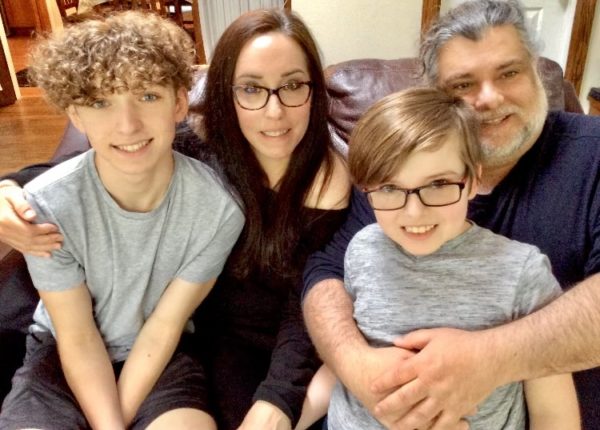Chrissy Carbone has always had moles on her skin. She never dreamed that the innocent-looking “beauty marks” could become life-threatening. #ThisIsSkinCancer
While it’s true that common moles are not dangerous, Chrissy was unaware that people with many moles have a greater risk for melanoma. “I’m covered in freckles, beauty marks and moles; they’re everywhere,” the Long Island mother of two explained. “They are such a part of me, I never gave them a second thought.”
“What’s That?”
One day in 2018, Chrissy’s husband pointed to a mole on her thigh and asked, “What’s that?’”
“I told him, ‘Oh, that’s just my beauty mark; I’ve always had it.’” When she took a closer look, the spot did seem bigger. Just to be safe, during her 2019 physical exam, Chrissy showed the mole to her primary care doctor, who noted that the borders were even and told her it looked fine.
Later that year, it began to change.
“It felt irritated and got really funky, turning blackish, almost bluish and bubbly,” she said. “And I thought, This is not normal. This is not OK.”
#ThisIsSkinCancer
In early 2020, Chrissy saw a dermatologist. By then, the mole displayed three of the ABCDE melanoma warning signs: multiple colors (C), darkness (D) and evolution (E). The biopsy results confirmed her worst fears: She had melanoma. Further testing revealed it had spread to one of her nearby lymph nodes, putting her at stage III.
A frightening new reality took hold. “I thought, My life is in danger. I have a family. What am I gonna do?”
Thankfully, Chrissy’s doctors had a plan. Postoperative scans showed no evidence of disease; her surgeon had removed it all. But because cancer is microscopic, her oncologist recommended immunotherapy every three weeks for one year, to reduce the risk of recurrence. Her treatments coincided with the beginning of the COVID-19 lockdown, but that did not deter her. “I would do anything,” she explains. “I don’t want it to ever come back.”
In April 2021, after 17 rounds of immunotherapy during a global pandemic, Chrissy completed her melanoma treatment, grateful for cancer research, science and her medical team. “I have four more years of surveillance and scans ahead, but surgery and treatment are behind me,” she said. “I’m praying that this beast of a disease never returns.”
Her best advice? “I feel like if there’s anything that you can do to prevent any kind of cancer, you should just do it.”
Early Detection and Sun Protection
With treatment in the rearview mirror, Chrissy embraces every day with newfound enlightenment.
“This experience was a smack in the face wake-up call, telling me ‘Hey — slow down. Pay attention to your body,’” she explains. “In hindsight, that beauty mark really was not normal looking. Back then, I thought to myself, No way this is cancer. But it was.” While most melanomas arise from normal-looking skin, about 20 to 30 percent of melanomas are found in existing moles like Chrissy’s.
In addition to looking more closely at her skin and monitoring her moles, Chrissy has upped her sun protection game. Now, she uses sunscreen every day, wears sunglasses and covers up in sun-protective clothing.
“When we were growing up, we didn’t get the connection between sun exposure and skin cancer. We fried,” she said. “I’m sure I got more than five sunburns as a teenager, and now I know that this increases my risk for melanoma.”
Cherishing and Protecting Her Family
Cancer also taught Chrissy the importance of being present. “l learned to really cherish the time with my kids and my whole family, and enjoy every single moment,” she said.
Chrissy and her family. Photo: Chrissy Carbone
She’s also focused on making sure that her children and extended family get the message: Wear sunscreen every day. Don’t get sunburned. Never use tanning beds. Check your skin regularly. If you see anything new, changing or unusual, have it looked at by a dermatologist right away. Schedule a professional skin exam once a year.
“We’ve all woken up,” she said; “we’ve all learned from it. My brother and sister have been checked. Our children, too. It’s very much a part of our lives. Honestly, skin cancer is preventable.”
Her best advice? “I feel like if there’s anything that you can do to prevent any kind of cancer, you should just do it.”
The post From Beauty Mark to Melanoma appeared first on The Skin Cancer Foundation.

